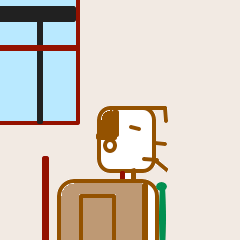"You lied to me,” said Cornel Wilde.
“And you were a sap for believing me,” said Ruth Roman.
“I loved you,” said Cornel.
“You thought you loved me,” said Ruth. “But you’re like every other man. You only love yourself – or should I say your pathetic conception of yourself?”
“That’s very harsh, Melinda.”
“Life is harsh. Love it or leave it, chump.”
Bubbles gave Addison a nudge with her elbow.
“Okay, this is where we came in.”
“Yes, I believe you’re right,” said Addison. “Do you want to stay and watch the ending again?”
“No, we know how it ends, and it don’t end good for Ruth Roman.”
“Hey, you two,” said some guy in the row behind them. “Clam up. We’re trying to watch the movie here.”
Bubbles turned around in her seat.
“Keep your shirt on, pal. We’re leaving anyway.”
“Good,” said the guy. “Don’t let the swinging doors hit you in your asses on the way out.”
“How’d you like me to swing my pocket book right in your fat face?” said Bubbles.
“You just try it, sister,” said the guy.
“Sammy,” said the girl sitting next to the guy, “will you shut up and just let them leave?”
“She started it,” said the guy.
“Hey,” said some other guy sitting in the row behind the first guy, “will you all please just shut the hell up?”
“Don’t tell me what to do,” said Sammy. “I am a veteran.”
“Yeah, I’ll bet you are,” said the new guy. “A veteran of the United States Army of Assholes.”
“Why, you, I’ll bet you were a 4-F conscientious objector,” said the first guy.
“Spent the war cleaning slop pails at Bellevue!”
Suddenly the two guys were trying to punch each other over the seat backs, and the one girl was screaming, so Bubbles grabbed Addison’s arm and said, “Come on, Atcheson, let’s split before World War Three breaks out in this place.”
Outside under the marquee on Thompson Street it was dark now beyond the lights of the movie house and the cold rain was still coming down. Bubbles took her Philip Morrises out of her purse and lighted herself up with her lighter.
“Oh, you want one, Atcheson?”
“Well, only if I may,” said Addison.
“Yeah, sure you may,” said Bubbles. “Otherwise I wouldn’t have offered you one.”
“Thank you,” said Addison. “Thank you very much, Bubbles.”
“Don’t mention it,” said Bubbles, giving him a light. “But just once I want to see you buy a pack of cigarettes. Just once.”
Addison exhaled a delicious lungful of smoke into the cold wet air.
“I promise you, dear Bubbles, that I shall buy a pack of cigarettes at the very first opportunity.”
“Can I say something?” said Bubbles.
“Oh, please do,” said Addison.
“You are the gayest straight guy I have ever met in my life,” said Bubbles.
“I try to be gay,” said Addison.
“I don’t mean that kind of gay,” said Bubbles. “I mean homo gay.”
“Oh. Perhaps I should take that as a compliment?” said Addison.
“Take it any way you like,” said Bubbles.
“So what did you think of the movies?” said Addison.
“I liked that one with Cornel Wilde and Ruth Roman, what was it called.”
“The Night Before the Dawn I believe.”
“Right, I liked that one. I’m just sorry Ruth Roman got plugged in the end by Raymond Burr. I liked her. She was my kind of dame.”
“Yes, she was a very – dynamic character.”
“She didn’t brook any nonsense.”
“Like you,” said Addison.
“Yeah,” said Bubbles, and she looked at Addison. “Like me.”
“In a sense,” said Addison, “and again like you, dear Bubbles, she was a true existential heroine, neither giving nor asking quarter of an indifferent universe.”
“Except she gets plugged in the end.”
“Yes, that’s true.”
“Why do the tough dames always got to get plugged in the end?”
“I’m not sure,” said Addison, “but I think it might have something to do with the Production Code.”
“Nuts to the Production Code.”
“Ha ha.”
“You know what I do when I watch these movies?”
“No,” said Addison.
“I imagine my own endings to them. Like in my ending Ruth Roman doesn’t get shot. Instead she shoots Raymond Burr, and then when Cornel Wilde tries to arrest her and bring her in, she shoots him, too.”
“Well, that would be, um –”
“A much better ending.”
“It does seem a little unfair for her to shoot Cornel Wilde, though. I mean, he was only a police detective trying to do his job.”
" Okay, so maybe she gives him a break for old time’s sake and she just makes him handcuff himself to the radiator with his own handcuffs. Then she grabs Raymond Burr’s swag from the wall safe and she hightails it out of there, heads off to the train station and goes to some other city. Starts a new life with Raymond Burr’s loot from the heist. Maybe opens up a hat shop.”
“A hat shop?”
“Whatever. Dress shop, hat shop. But she starts her own business, where she don’t have to answer to anybody. That’s how I would’ve ended the movie.”
“Would you like to open a hat shop, Bubbles?”
“I can’t spend my whole life giving Baltimore handshakes for three bucks a shot, pal. I’m saving my money, believe you me.”
“How much do you have saved?”
“None of your damn business.”
“Sorry. It’s just I’ve always admired anyone who could save money. God knows I’ve never been able to.”
“How much of that fin have you got left?”
“Well, let’s see, it was ninety cents for the movie tickets, plus another thirty cents for the large popcorn and the cokes, and, um, a nickel for the box of Raisinets, oh, and another nickel for the Milk Duds –”
“We got enough for a couple of drinks over at the San Remo, let’s go.”
“You want to have drinks with me?”
“That’s what I said, wasn’t it? Maybe we’ll get a bite to eat, too. I could go for some of that spaghetti marinara there.”
“Well, I only have –”
“Don’t sweat it. I have my own dough. Now put that umbrella up.”
“Yes, of course,” said Addison.
He had been hoping to save three dollars for a Baltimore handshake, but he figured he had best not push his luck with Bubbles. What a woman!
They forged out into the cold stinging rain under Addison’s umbrella, Bubbles holding Addison’s arm. He knew he was not worthy of such a woman, but he didn’t care, and he had never felt so alive in all his life.





















































